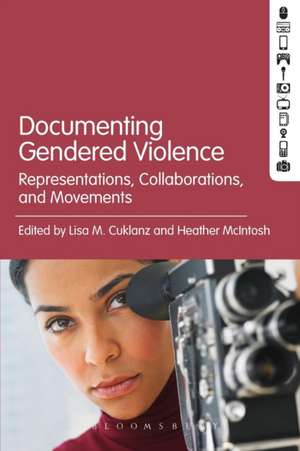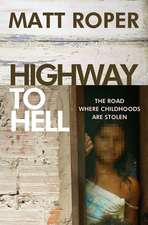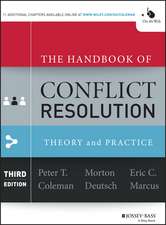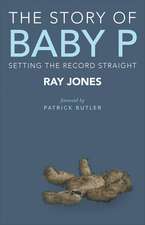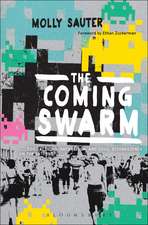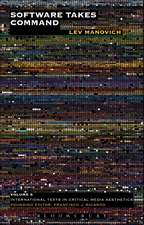Documenting Gendered Violence: Representations, Collaborations, and Movements
Editat de Lisa M. Cuklanz, Heather McIntoshen Limba Engleză Paperback – 24 aug 2016
| Toate formatele și edițiile | Preț | Express |
|---|---|---|
| Paperback (1) | 257.97 lei 6-8 săpt. | |
| Bloomsbury Publishing – 24 aug 2016 | 257.97 lei 6-8 săpt. | |
| Hardback (1) | 832.80 lei 6-8 săpt. | |
| Bloomsbury Publishing – 22 apr 2015 | 832.80 lei 6-8 săpt. |
Preț: 257.97 lei
Preț vechi: 331.43 lei
-22% Nou
Puncte Express: 387
Preț estimativ în valută:
49.36€ • 52.79$ • 41.16£
49.36€ • 52.79$ • 41.16£
Carte tipărită la comandă
Livrare economică 17 aprilie-01 mai
Preluare comenzi: 021 569.72.76
Specificații
ISBN-13: 9781501319990
ISBN-10: 150131999X
Pagini: 288
Dimensiuni: 152 x 229 x 15 mm
Greutate: 0.39 kg
Ediția:NIPPOD
Editura: Bloomsbury Publishing
Colecția Bloomsbury Academic
Locul publicării:New York, United States
ISBN-10: 150131999X
Pagini: 288
Dimensiuni: 152 x 229 x 15 mm
Greutate: 0.39 kg
Ediția:NIPPOD
Editura: Bloomsbury Publishing
Colecția Bloomsbury Academic
Locul publicării:New York, United States
Caracteristici
Discusses TV documentaries (Sex Crimes Unit), documentary theater (Ruined), and multi-media platforms (Sin by Silence)
Notă biografică
Lisa M. Cuklanz is Chair of the Department of Communication at Boston College, USA, and is the co-editor of Violence, Global Media: Feminist Analyses of Gendered Representations (2009) with Sujata Moorti. She is also the author of Rape on Prime Time: Television, Masculinity, and Sexual Violence (2000) and Rape on Trial: How the Mass Media Construct Legal Reform and Social Change (1996). Heather McIntosh is Assistant Professor of Mass Media at Minnesota State University, Mankato, USA. Her research has appeared in Journal of Popular Film & Television, Quarterly Review of Film and Video, and Popular Music & Society. She also writes as a blogger for PBS's P.O.V. series.
Cuprins
Acknowledgements Notes on Contributors Chapter 1Introduction: The Intersections of Documentary and Gendered ViolenceHeather McIntosh Chapter 2Creating a Sense of Reality in Sex Crimes UnitLisa Cuklanz Chapter 3Calling the Consumer Activist, Consuming the Trafficking Subject: Call + Response and the Terms of LegibilityAnnie Isabel Fukushima and Julietta Hua Chapter 4'The Nation Wants to Know!': Documenting Sexual Violence on Indian Primetime Television NewsSwati Bandi Chapter 5When Solidarity Melts into Air: Philippines-Born Women Migrants in AustraliaShirlita Africa Espinosa Chapter 6Global Sex Work, Victim Identities, and CybersexualitiesWendy S. HesfordChapter 7'This is about Way More than Bullies': User-Generated Video, Narrative Multiplicity, and LGBTQ Youth IdentityLauren S. BerlinerChapter 8A tráves de mis ojos: Fototestimonios with Children Growing Up in Immigrant and Migrant Communities in Northern CaliforniaNatalia Deeb-SossaChapter 9Staging Gender Violence in the Congo: Reading Lynn Nottage's Ruined as a Documentary DramaPhyllisa DerozeChapter 10Making The Invisible War VisibleLaura VazquezChapter 11The Committed Documentary and Contemporary Distribution: A Look at Sin by SilenceHeather McIntosh Chapter 12Anatomy of Filmmaking Practice: Documentary and Gendered ViolenceRuth Goldman FilmographyIndex
Recenzii
Concentrating on gender and violence as documentary themes, Documenting Gendered Violence surveys current critical and scholarly positions on a vital area of contemporary media and, at the same time, provides timely analysis of an urgent socio-cultural problem. The interdisciplinary breadth of approaches represented by the cumulative authorship and international range of topics collected here make this book unique and valuable to anyone interested in contemporary documentary film and media, the traditions of feminist documentary, feminist media studies, and the legal, historical, therapeutic and aesthetic discourses of witnessing and testifying.
Documenting Gendered Violence is a major contribution to both documentary studies and feminist studies of gender and violence. In bringing together these two areas, this timely - and politically urgent - collection of essays focuses much needed scholarly attention on global documentary productions dealing with gendered violence. Exploring a rich and varied number of documentary texts from around the world, and employing a range of critical approaches, Documenting Gendered Violence raises crucial questions about the possibilities of documentary form and practice. I strongly recommend this book to anyone who has an interest in the socially committed documentary and a stake in the struggle against gender-based violence.
An important and engaging collection. The contributions examine not only the representation of violence in documentary films, but also the way documentary films might intervene into these representations, exploring an under-theorized area of both violence and documentary scholarship.
Documenting Gendered Violence is a major contribution to both documentary studies and feminist studies of gender and violence. In bringing together these two areas, this timely - and politically urgent - collection of essays focuses much needed scholarly attention on global documentary productions dealing with gendered violence. Exploring a rich and varied number of documentary texts from around the world, and employing a range of critical approaches, Documenting Gendered Violence raises crucial questions about the possibilities of documentary form and practice. I strongly recommend this book to anyone who has an interest in the socially committed documentary and a stake in the struggle against gender-based violence.
An important and engaging collection. The contributions examine not only the representation of violence in documentary films, but also the way documentary films might intervene into these representations, exploring an under-theorized area of both violence and documentary scholarship.
